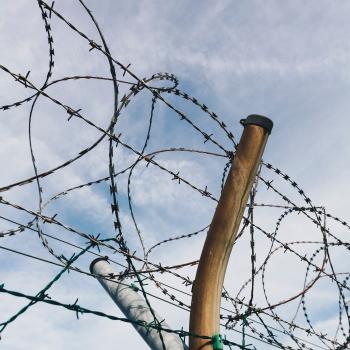“If we get to the part of the curve where it goes down to essentially no new cases, no deaths for a period of time, I think it makes sense that you have to relax social distancing.”
This is what Dr. Anthony Fauci said a few days ago. He is a good man. I am glad our president is listening to him. He is also dead wrong. He is not wrong because he does not understand the biology of what is occurring. He is wrong because the biology of the situation is the only thing he is taking into account. Unless we have a holistic approach to fully deal with the long term impact of the coronavirus we will not maximize our efforts to deal with all of the ramifications of this problem. And part of that long term perspective is to listen to those of us who are trained to understand our society. And I fear that the perspectives of social scientists have not been heard.
I do not have expertise in issues directly pertaining to the Coronavirus crisis but I have an academic understanding of society and so I can speak to that. It is from that understanding that my first observation is this: We are unbalanced in our approach. We have heard from medical experts, economic experts and legal experts but I find that many, if not most, individuals only want to pay attention to what the medical experts, such as Fauci, have to say. I fear that is an unbalanced way to handle this crisis and can lead to serious problems.
Let me be crystal clear because I know there will be those who want to strawman my argument. I am not saying that we should ignore the advice of medical personnel. What I am saying is that we should not ONLY listen to medical personnel. This virus is creating a multi-dimensional problem in our country, and we will need a multifaceted approach to deal with it. Medical personnel are not trained and do not have the expertise to handle the economic, legal and social consequences of their suggestions. We need other voices to find the most complete solutions.
I am certain some are thinking that I want to put the economy, legal rights, social convenience or some other secondary matter before the preservation of life. Actually, the opposite is true. I believe that the best way to save and preserve lives is to develop a multifaceted approach. This is especially true as it concerns the social consequences of our current approach. When Fauci talks about waiting until there are absolutely no new cases, he is talking about social distancing for several months. I assume that in his analytical approach this makes sense as that would be strong evidence that the virus is no longer strong enough to do a great deal of damage. However, his focus on only these biological factors obscures other costs that are much more than he may realize.
So, let’s start with the major and more obvious costs. What do you think is going to happen with the level of depression while we are waiting for absolutely no new cases of coronavirus? What do you think isolation will do to many unstable individuals? Individuals who likely will not get the face-to-face therapy they need because of social distancing. What about the rates of suicide? Think that is going to remain stable over a long period of social distancing? If you do, then I would like to have what you are smoking because it must be some good stuff.
How about rates of abuse? I ran across an article about the rise of child abuse in our local area. I guess we can multiple this by what – 200 across the country. That is not to mention basic domestic violence and elder abuse. This is foreseeable due to the added stress that has developed as people deal with their social confinement. Relatively speaking we have a good setup for this situation. I can work from home pretty easily and my mother-in-law comes over almost every day to help us with our three boys. Yet I can tell you there is added stress here in our house. I cannot help but think about the households that do not have the middle class advantages that we enjoy and the potential of violence, and yes even death.
In other words, there will be an increase in death directly due to this situation of social distancing. I am not saying that this death level will encompass the potential deaths from the virus. To be honest I do not know and neither do you because we have never done anything like this before. But should we not be talking about this as we make decisions about how long we are going to do social distancing. We would if we were looking at sociological research and not just medical consequences.
Now these issues are only the ones we will see immediately. What truly scares me are the long-term consequences. The advantage of our current strategy is that the benefits are clear and short term while much of the cost is unclear and long term.
Let me show a couple of examples of how that shapes our approach to social problems. When I teach about crime in my social problems class, I point out that white collar crime actually costs more lives than street crime. The street criminal shoots a person and we have an immediate death. The white-collar criminal businessman hides asbestos and 100 people have their lives shorted by 15 years. He caused more death, but it was long term and not obviously linked to his actions. But more people are dead because of his actions. The second example is environmental measures. Often the benefits of shutting down a polluting factory are long-term and diffuse. The costs of loss of jobs are immediate. It becomes hard to justify shutting it down even though more people will benefit from its closing.
Some of the long-term consequences are like these examples. Medical epidemiologists can predict the potential short-term loss of life. I have less confidence in their prediction of the long-term loss of life. For example, many people dismiss concerns about the economy. But research clearly shows that poverty is linked to a shortened lifespan. Those people will not be dead in a few months, but if they are thrown out of job due to our current actions many of them will have a shorten lifespan.
But beyond economic price. the social costs of social distancing may be overwhelming and we cannot yet know just how overwhelming they will be. Let’s take divorce. With the added stress it is almost certain that we will see more than a little uptick in the level of divorce in our society. We actually have been enjoying a decrease in the divorce rate in recent years. But the additional stress of social distancing is almost likely to go up and go up quite significantly if this type of measure remains for too long. The combination of being isolated from the presence of others and not being able to easily obtain counseling will be too much for some marriages to survive. We do know what happens in divorce. We know that the children are more likely to engage in deviance, to have troubled relations in the future, and to commit suicide. There is debate about whether the conflict leading up to a divorce or the divorce itself that creates these dysfunctions. But for the purposes of this discussion, it really does not matter. If social distancing is creating the atmosphere for divorce, then it is still contributing to these long-term problems.
Speaking of long-term problems there is research about the long-term effects of the Challenger disaster. Children who witnessed that tragedy become more fearful of their future than those who merely heard about it. Have we asked questions about the possible long-term trauma of social isolating our children for the better part of a year? All our children are experiencing that isolation. My boys already miss their classmates and being unable to even go to a playground. What are the long-term consequences of doing this to our children? What sort of society will these individuals create?
There is no way we can accurately answer these questions right now, but they need to be asked. We cannot know how many lives may be lost due to higher crime rate or suicide rate tied to the changing culture or failing families. But we can take these issues into consideration when we plan our response to this crisis. Medical epidemiologists will not ask these questions or consider these issues. It is not part of their training. We need other voices in this conversation.
So let me be clear. And to be absolutely clear I am going to put a comment in all caps. Because I know how things work and some who disagree with me will not content themselves with merely disagreeing with me but will also want to take my arguments out of context. I will use this all caps statement so that those who do so are either dishonest or blind. So here it goes. I AM NOT SAYING THAT WE SHOULD IGNORE OUR MEDICAL EXPERTS. I AM SAYING THAT WE MUST NOT JUST LISTEN TO OUR MEDICAL EXPERTS SINCE THERE ARE OTHER WAYS LIVES CAN BE LOSS. AND SOME OF THOSE WAYS WILL BE DUE TO OUR RESPONSE TO THIS CRISIS.
We have been told that the idea is to “flatten the curve”. The argument is that we have to keep the number of sick down to a manageable level so that we do not overload the system. Waiting until there are absolutely no new cases is not merely waiting for our medical capacities to be able to handle all of the cases. If we get to the day that we only have 1 or even 10 new cases of coronavirus, I dare say that our medical system will be able to handle it. Yet Fauci’s comment indicates that even then we must continue to practice social distancing.
Let’s pretend that we have gone down to a single death a day of coronavirus. According to Fauci’s standard we still have to maintain social distancing. Some will say that this is the moral way to go. Should we not put up with inconvenience to save one life? But how many other lives will be lost that day? How many suicides will take place after such a prolonged period of distancing because we maintained it one more day? Additional cases of domestic violence? Additional divorces? The cost to saving that one life is not one more day of not seeing our friends in person. It will be paid in the lives of other people who might have lived if we came off our social distancing regime a little sooner.
But even though preserving life should be the highest goal, it should not be the only goal. I am not a libertarian. I am probably pretty opposite of libertarians. But I feel more libertarian than I ever have been in my life. I am concerned about the costs in our society of our freedoms. Clearly I am not alone in this.
Let’s play this out shall we? With a long-term social distancing strategy, you are going to have people who revolt against it. The stress and struggles of being isolated from others is certain to create a groundswell of rebels. What will happen when they take to the streets? We already have seen cities and states impose shelter in place orders so they will be violating the law if those remain in place. Do we leave them alone and risk further disobedience? Or does the government crack down on them? If we are trying, as we are repeatedly told, to save millions of lives, it seems that such a crackdown is warranted.
I am nervous because once we start cracking down, then when does it stop? It is hard for politicians to give up power if they do not think they have to. A crisis provides them with the justification to use police power to control citizens. Will whoever is president at that time – Trump or Biden – easily stop the use of police force if they can justify the saving of lives? Will there be long term legal changes in response to this crisis? Maybe not. But is not now the time to start discussing what we can do to protect our legal rights to assemble and even worship? Social pressure to alter actions may not be as powerful as the use of legal and police force, but it is needed so that we are fully protected from possible legal abuse. And this is one of the reasons why we need to listen to legal experts as well as medical experts as we craft our response to the coronavirus.
I suspect that there is a window in time where we can shift away from social distancing in a way that minimizes damage from the virus and from a failed economy and society. If we wait too late the lives saved by not exposing individuals to the virus will be less than the lives lost and shortened due to depression, suicide and domestic abuse. If we come off this period too soon, then the disease will take more lives. We need to appreciate that either extreme is dangerous instead of ignoring only one of the extremes. The timing of moving away from social distancing is crucial and it will not be easy to determine when is the best time to move away from it. But our chances of making that decision are much better if we have a holistic calculation that does not just rely upon medical information when social, economic and legal issues are pertinent as well.
None of this means that I trust Trump’s efforts to have businesses humming as soon as possible. I don’t. While we cannot neglect the economy, we must assess all competing problems by weighing information from all different sources. If in conjunction with advice from the finest medical, economic, social, legal, and even organizational experts, Trump concluded about when to try to jump start our economy, then I would feel better about his decision. But, to be kind, this current president has not shown me the ability to deal with such issues in a sophisticated manner. I suspect that his decision to move away from social distancing will not be after fully considering the implications of his words and actions. We must hope that his famous “gut” feeling on when to shift away from social distancing is accurate, even if it is accurate by accident.
Nonetheless, this is a multifaceted problem and we need a multifaceted approach. Simplistic answers only distort the issues at play. Paying attention to only medical doctors now can result in unnecessary deaths just like paying attention to only economists earlier in this crisis. Let’s take what all of the experts say very seriously and weight them accordingly. That is the best way to find a solution that does the most good.












